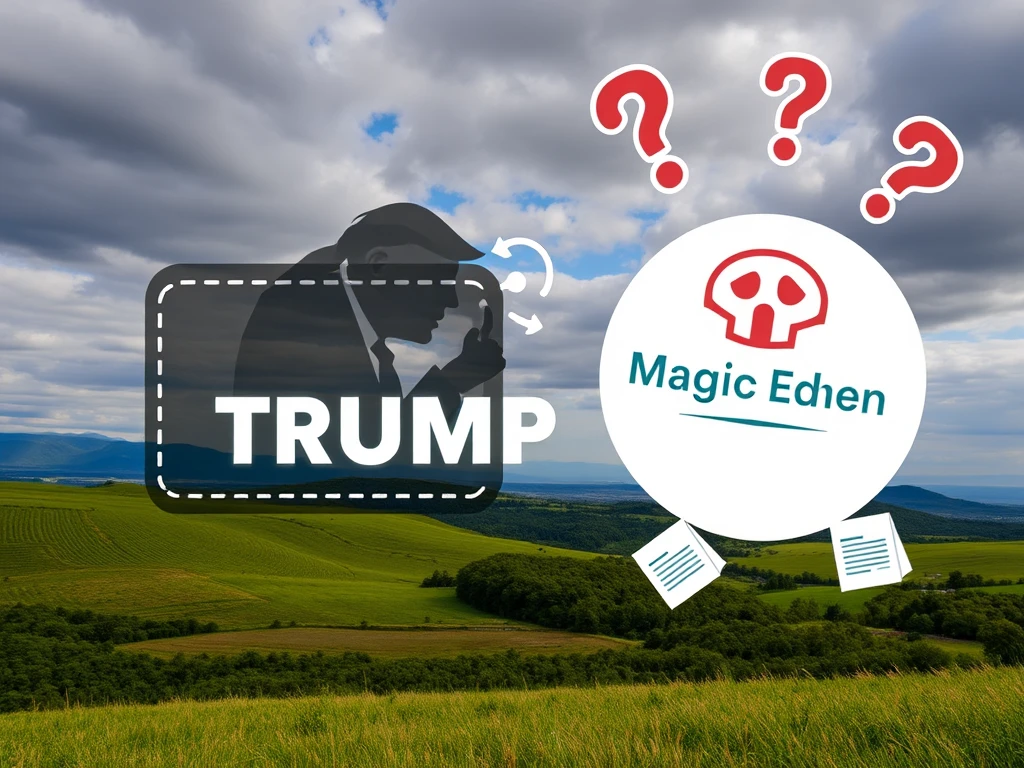Trump Wallet Scandal: Shocking Details Emerge About Magic Eden’s Role

The crypto world was recently rocked by the emergence of the “Official $TRUMP Wallet,” a project that quickly turned into a major scandal. What started as a seemingly legitimate crypto wallet backed by the TRUMP brand and featuring a prominent NFT marketplace as a partner, rapidly unraveled when the Trump family disavowed any connection. This situation has left many asking: Was Magic Eden truly involved, or were they simply caught in the crossfire of a crypto branding dispute? The Trump Wallet saga highlights the complexities and risks in the intersection of celebrity branding and digital assets.
The Controversial Launch of the Trump Wallet
On June 3, 2025, a website promoting the “Official $TRUMP Wallet” appeared, promising a new way for users to trade Trump crypto and other digital assets. The site heavily featured Magic Eden, a well-known NFT marketplace, as a partner, giving the project an immediate sense of credibility. The wallet, unveiled by Fight Fight Fight (a company linked to Trump associate Bill Zanker), claimed broad support for Bitcoin, Solana, Ether, Magic Eden’s own ME token, and “all other tokens.” It also boasted integration with Slingshot Finance technology, acquired by Magic Eden. Early users were even promised $1 million in rewards. This presentation suggested a significant, well-backed launch.
Trump Family Says: “Not So Fast!”
The perceived legitimacy of the wallet was short-lived. Within hours, Donald Trump Jr., Eric Trump, and Barron Trump issued clear public statements denying any involvement or approval. This wasn’t just a simple denial; the Trump family’s official crypto platform, World Liberty Financial, announced its own upcoming wallet project, creating a direct conflict. Legal action followed, with cease-and-desist letters sent to both Fight Fight Fight and Magic Eden, citing unauthorized use of the Trump brand. This swift, coordinated response underscored the family’s position: this was not an official Trump crypto initiative.
Magic Eden’s Position: Partner or Pawn?
A central question is the true extent of Magic Eden’s involvement. While the wallet website listed them as a partner, the Trump family’s denial complicated the picture. However, statements from Magic Eden CEO Jack Lu seemed to confirm a level of endorsement. Lu promoted the wallet on social media, calling it “the first and only crypto wallet for true Trump fans” and emphasizing the potential for mainstream adoption. The wallet’s technical foundation, using Slingshot Finance (a Magic Eden acquisition), and the large reward pool further suggested a deeper connection than a simple name-drop. Did Magic Eden believe it had legitimate authorization, perhaps based on previous interactions with the TRUMP token team, or was there a critical breakdown in verifying brand rights? The situation highlights the challenges platforms face in the Web3 space regarding celebrity branding.
Understanding Fight Fight Fight and the TRUMP Token
The entity behind the “Official $TRUMP Wallet” is Fight Fight Fight, led by Bill Zanker, a longtime associate of Donald Trump. Fight Fight Fight is heavily involved with the TRUMP token itself. Together with another entity, CIC Digital, Fight Fight Fight controls a significant 80% of the TRUMP token supply. This high concentration of ownership raises questions about the token’s decentralization and how control over a token ecosystem intersects with brand identity. The TRUMP token gained prominence as a meme coin, often promoted as “official,” and events like a dinner hosted by Trump for tokenholders reinforced this perception. However, the wallet scandal demonstrated that control of the token doesn’t automatically grant rights to use the brand for other products like a crypto wallet.
What This Means for NFT Marketplaces and Crypto Wallets
The fallout from the Trump Wallet scandal has significant implications for the wider crypto industry, particularly platforms that list or integrate with branded projects. For NFT marketplace operators and crypto wallet providers, this case is a stark warning about the need for rigorous brand verification.
- Stronger Vetting: Platforms may need enhanced protocols to verify brand partnerships and intellectual property rights before promoting or integrating projects.
- Clearer Disclaimers: Platforms might need to implement clearer disclaimers about their role and responsibility when featuring third-party projects.
- Brand Verification Tools: The industry could see a push for better technical or legal mechanisms to prevent unauthorized brand use.
This incident also adds to the growing scrutiny of political figures and celebrity endorsements in crypto, potentially influencing future regulatory discussions, like those surrounding proposed legislation such as the MEME Act.
Conclusion
The “Official $TRUMP Wallet” scandal, involving claims of Magic Eden partnership and swift disavowals by the Trump family, serves as a critical case study in the volatile world of branded crypto assets. It highlights the risks platforms face when brand authorization is unclear and the challenges of navigating celebrity involvement in Web3. While the project was quickly halted, the questions it raised about due diligence, platform accountability, and the intersection of brand control and token ownership will likely resonate throughout the industry for some time.








